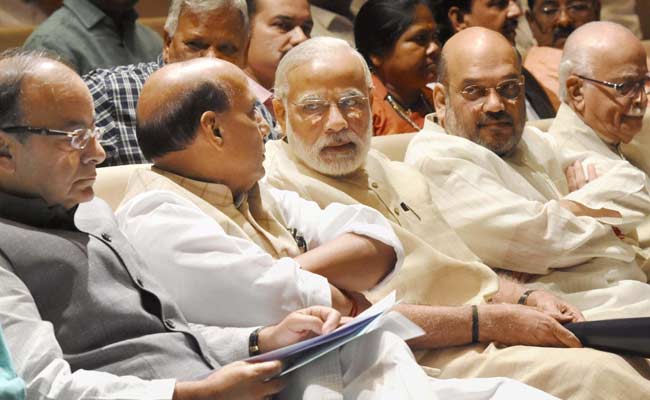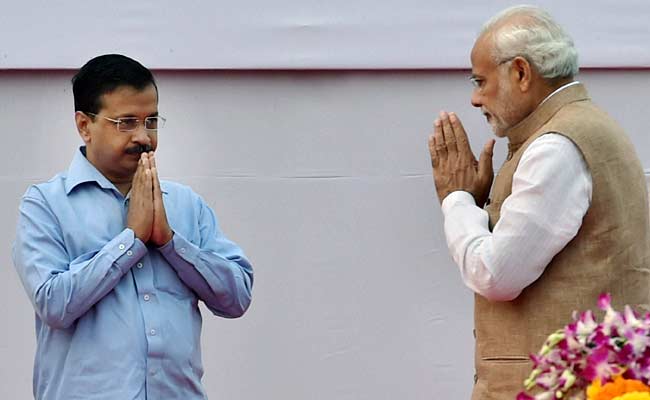Seeds of such changes are mostly sown in the first year of the assumption of power. Narasimha Rao ushered in economic reform by de-licensing industries in his first budget presentation, the results of which were far-reaching. Rajiv Gandhi brought in Sam Pitroda and created C-Dot. The present telecom revolution owes a lot to that initiative of Rajiv Gandhi. Barack Obama reached out to Muslims by giving a speech at Al-Azhar University, clearly making a policy statement that the US was no longer interested in continuing Bush's foreign policy while hinting at the withdrawal of US forces from Iraq and Afghanistan.
Narendra Modi is completing two years in the government and without any exception, making efforts which have the potential to permanently change the fundamentals of the Indian system and its value structures.
The social system's liberal tradition has been confronted with the one-dimensional behaviour pattern led by RSS's ideological zealots. The killing of Akhlaq in Dadri by BJP leaders because of his alleged eating habits is symptomatic of that assertion. Beef has been banned in Maharashtra despite protests by minority communities. The Kerala House in Delhi, which has been serving beef for decades, was raided by the Delhi police. Haryana Chief Minister ML Khattar has advocated that girls should not wear jeans. "Love Jihad" and "Ghar Wapsi" are excuses to stop Hindus and Muslims from inter-mingling. Aamir Khan and Shah Rukh Khan have been hounded for statements on intolerance.
Activists Kalburgi and Pansare were killed by people who could not tolerate them speaking their minds. The social atmosphere has been so vitiated that the President of India, Pranab Mukherjee has publicly prodded the government many times about its responsibilities, but without any substantive results.

PM Narendra Modi with BJP ministers and party veteran LK Advani (File photo)
The Modi government has been rigorous in its pursuit of denigrating Nehru, not just as an individual, but also in the context of his legacy. Modi knows that the Congress derives its ideological sustenance and legitimacy from Nehru and his liberal thoughts. To permanently discredit the Congress, Nehru's legacy has to be discredited. The legends of Subhas Chandra Bose, Vallabhbhai Patel, Baba Saheb Ambedkar and Bhagat Singh are being resurrected in an attempt to diminish the historical contributions of Nehru and erase him from the collective consciousness. The Rajasthan government has tried to remove Nehru from its school curriculum. The chairman of the Nehru museum has been replaced by a Nehru baiter.
Modi also knows that one liberal political discourse should not be replaced with another. So along with the Congress, other liberal political formations also have to suffer. Therefore the Arvind Kejriwal government and its leaders are targeted by central agencies because the Aam Aadmi Party brand has the power to grow into a national alternative. A very powerful Chief Minister confided in me that the plan was that by 2019, many senior leaders of opposition parties would be in jail and there would be no opposition to Modi.

Delhi Chief Minister Arvind Kejriwal and Prime Minister Narendra Modi (File photo)
overwhelmingly till India was opened to the world market in 1991.
Such was the dominance of the Left in the academic and intellectual universe in India that the RSS was relegated to the margins. JNU or Jawaharlal Nehru University in Delhi was the epitome of the Left's intellectual prevalence. To establish Hindutva ideology, that has to be discredited, broken and replaced. The RSS and the BJP did not mince words in calling Left intellectuals "anti-nationals", accusing them of colluding with terrorists, and describing universities like JNU and Jadavpur in
Bengal as dens of terrorists. These varsities are the knowledge leaders of the country, and very highly rated globally. They have to be demolished in order to stitch a new intellectual paradigm. Kanhaiya got caught in that cross fire. He is an accident of history.
Many argue that Modi has not fulfilled the promises he made during the 2014 elections. That kind of yardstick is applied to measure the success and failure of mere mortals. Modi is not one. He thinks he is a special child of history with a civilisational project. Those who thought that he would change the course of the economy are disappointed. Despite India being the fastest-growing economy, job growth is at its lowest in the last six years, eight core industries are shrinking, inflation is down but export figures are discouraging, the rupee is highly stressed, and social conflict is growing. The Jat and Patidar movements have been examples of civil unrest, but the Modi government is oblivious. Modi is busy laying the foundations of a new ideological edifice. In communist parlance, once the base is solidified, the super structure will take care of itself.
Two years of Modi in government tell a singular story which looks strange and intimidating to many, but for his supporters and ideological friends he is doing a good job. Paul Eldridge, famous writer, said, "Man is ready to die for an idea, provided that idea is not quite clear." There were many, other than his ideological friends, who were willing to die for Modi in 2014; for them he was a refreshing idea. For many of them, that idea is now losing its sheen. Or maybe the idea is getting clearer.
(Ashutosh joined the Aam Aadmi Party in January 2014.)
Disclaimer: The opinions expressed within this article are the personal opinions of the author. The facts and opinions appearing in the article do not reflect the views of NDTV and NDTV does not assume any responsibility or liability for the same.


